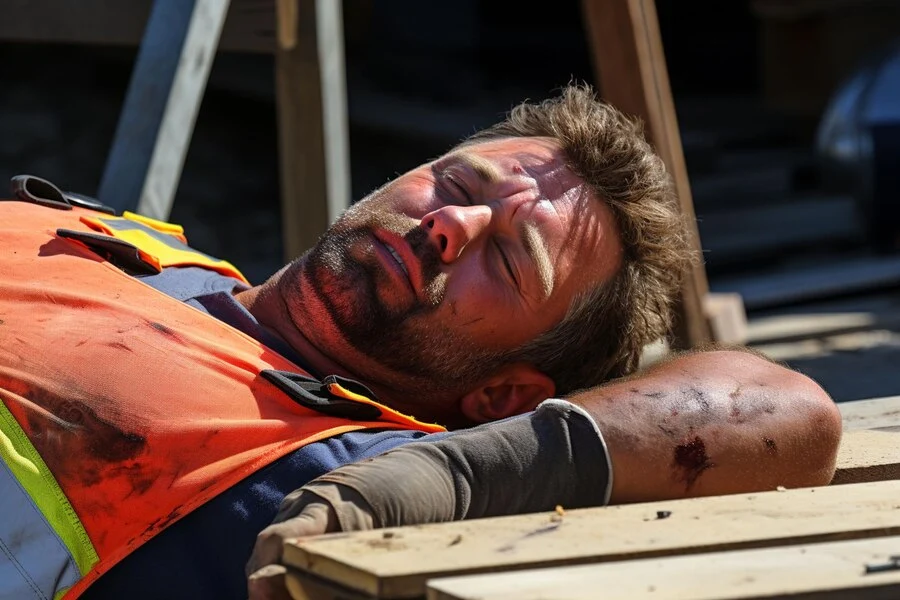personal injury lawyers
Fighting for maximum injury compensation for you and your family
No Fees Until We Win


Construction-Related Injuries Caused By Falling Debris Objects
When working on a construction site, it’s important to be aware of the dangers of falling debris.
These hazards are more common than you might think and can lead to serious injuries.
In this article, we will learn that in bustling areas like Newark’s downtown or the busy roads of the Garden State Parkway, the risk increases with the pace of work.
Not properly securing tools or ignoring safety protocols can have dangerous consequences.
Even weather conditions, like the strong winds along the Jersey Shore, can turn construction materials into hazardous objects, and can also lead to legal troubles.
That’s why understanding and preventing these risks is so important for everyone on a construction site.

Common Mistakes That Can Cause Serious Injury From Falling Objects
In construction, especially in busy places like New Jersey’s workplaces and roads, falling objects can cause serious injuries.
Here are some common mistakes to watch out for:
- Not Securing Tools Properly: On sites like the Garden State Parkway construction, tools left unsecured at heights can fall and injure someone below. This is a common oversight with significant consequences.
- Ignoring Safety Protocols: In busy areas like downtown Newark, it’s essential to follow safety rules. Skipping steps like not putting up safety barriers or nets can lead to accidents.
- Neglecting Weather Conditions: In coastal areas like the Jersey Shore, high winds can make objects like construction materials fly off. Not accounting for weather conditions is a risk.
- Poor Training: In places with complex projects, like the Pulaski Skyway, workers need proper training. Lack of training in handling materials and equipment can lead to accidents.
Case study: Austin Police investigate a tragic incident reported by austintexas.gov in March 2023, where a falling object from a high-rise construction site in West Campus led to the death of Michael Delgado, 29, as he rode his bike near Rio Grande Street.
Despite aid from UT students, Delgado succumbed to his injuries at a nearby hospital over the weekend.
Falling Debris Objects On Construction Sites – How Dangerous Are They?
Falling debris on construction sites is extremely dangerous. According to the Occupational Safety and Health Administration (OSHA), falling objects are among the top causes of fatalities in construction.
They can strike with a force equivalent to several times their actual weight, depending on the height they fall from.
According to the Bureau of Labor Statistics, over 200 fatalities were caused by falling objects on construction sites in a recent year. This shows how common and dangerous these incidents can be.
The National Safety Stand-Down from May 1 to May 5 focuses on preventing falls in construction, where almost 1 in 5 work-related deaths happened in 2021.
Over a third of these deaths resulted from falls, making up 46.2% of all fatal falls, slips, and trips that year, according to the U.S. Bureau of Labor Statistics.
Types of Injuries Caused by Falling Debris Objects
In the realm of construction site dangers, falling debris poses a significant threat, leading to various types of injuries:
Head Injuries
One of the primary risks is head injuries, ranging from concussions to traumatic brain injuries.
While helmets offer some protection, they cannot eliminate the risk, making it hard for workers to remain safe.
Cuts, Lacerations, and Bruises
Cuts, lacerations, and bruises are common consequences of sharp or heavy falling objects.
Workers must be careful in utilizing protective gear, such as hard hats and safety glasses, which becomes necessary in reducing these risks.
Eye Injuries
Eye injuries represent another category of harm caused by falling debris. Even small debris can cause significant harm to the eyes, emphasizing the need for safety goggles on construction sites that can have long-lasting consequences.
Back and Spinal Injuries
Back and spinal injuries are a serious concern when heavy objects fall. The impact can cause damage to the spine, affecting a worker’s mobility and overall well-being.
Wearing back support and regular training on proper lifting techniques are essential preventive measures to safeguard against such injuries.
Fractures and Broken Bones
Limbs, being particularly vulnerable, are at risk of fractures and broken bones due to falling debris.
Construction workers must be educated on the importance of seeking medical help without delay and be aware of emergency procedures in the event of a falling debris incident.
Crush Injuries
Crush injuries represent a severe consequence of larger debris falling, trapping, or crushing individuals beneath their weight.
The implementation of strict safety measures, including secure storage of materials and thorough site inspections, is vital in preventing incidents that can lead to crush injuries.
Internal Injuries
Internal injuries resulting from hard impacts can be just as debilitating as visible external injuries.
These injuries may not be immediately apparent, underscoring the importance of seeking medical evaluation even if no external wounds are evident.
Psychological Trauma
Beyond physical injuries, falling debris incidents can also cause psychological trauma.
Witnessing or experiencing such incidents may lead to post-traumatic stress disorder (PTSD).
Creating a supportive work environment that acknowledges and addresses the potential psychological toll is integral to the overall well-being of construction site workers.
What Precautions Should Be Taken to Minimize the Risk of Injury?
To minimize the risk of injury from falling debris, especially in busy areas like construction sites in New Jersey, certain precautions are essential:
- Secure Materials and Tools: Ensure all materials and tools are securely fastened. For instance, on high-rise projects in Jersey City, this could prevent tools from being blown off the building by strong winds.
- Safety Gear: Workers must wear appropriate safety gear, including hard hats, safety glasses, and steel-toed boots, as per OSHA regulations. On sites like the Garden State Parkway construction, this is vital for worker protection.
- Routine Safety Checks: Regularly inspect scaffolding, ladders, and other equipment. For example, frequent checks on the Pulaski Skyway can help identify potential hazards.
- Training: Provide thorough safety training for all workers. In New Jersey, this could involve specific training on handling equipment safely in coastal weather conditions.
- Signage and Barriers: Use clear signage and physical barriers in areas like Route 9 or the New Jersey Turnpike, to warn of potential falling debris.
- Emergency Plans: Have a clear plan in place for emergencies. For example, construction sites in Newark should have procedures for quick evacuation in case of falling debris.
- Legal Compliance: Adhere to local and federal safety laws. In New Jersey, this means following guidelines set by the NJ Department of Labor and Workforce Development and OSHA.
Get Help From a Construction Site Accident Attorney Today
If you’ve been injured in a construction site accident in New Jersey, don’t hesitate to reach out to experienced construction site accident attorneys like Rosengard Law Group.
They have a legal understanding of local construction sites and can help you navigate the legal process of documentation, filing, and court proceedings to maximize your compensation.
Here’s why:
- Know Your Rights: An attorney can explain your legal rights. In New Jersey, construction workers are protected under various laws, including the Occupational Safety and Health Act (OSHA) and state-specific regulations.
- Claims: They can guide you through workers’ compensation claims or personal injury lawsuits. In New Jersey, workers’ comp is a common route, but sometimes, a lawsuit might be needed, especially if there’s a third-party liability.
- Experience with Local Sites: Local attorneys are familiar with New Jersey construction sites, from the bustling roads of Newark to the developing areas of Jersey City. They understand the specific risks and regulations of these locations.
- Maximizing Compensation: They can help maximize the compensation you receive, covering medical expenses, lost wages, and other damages.
FAQs
What should I do if I witness a falling debris incident on a construction site?
If you see falling debris at a construction site, stay safe and quickly tell the site manager about it.
What to Do If You Suffer a Construction Site Injury: What are Your Rights?
If you get hurt at a construction site, you have the right to seek medical help, tell your boss about the injury, and possibly get money to help with your injury through legal action.
Conclusion
Falling debris injuries on construction sites are a serious concern. Mistakes such as not securing tools properly, ignoring safety protocols, neglecting weather conditions, and poor training can lead to these accidents.
Falling debris on construction sites is extremely dangerous, with the potential to cause head injuries, cuts, eye injuries, and more.
Reach out to the consultants, they can explain your rights, guide you through claims, utilize their knowledge of local sites, and help maximize compensation.
Awareness, proper safety measures, and the right legal support are key to prevention and response. Stay safe and informed!

Free Injury Case Evaluation
Send the form below and we will call you back in minutes.
…or Call Us Now
856-284-6446
